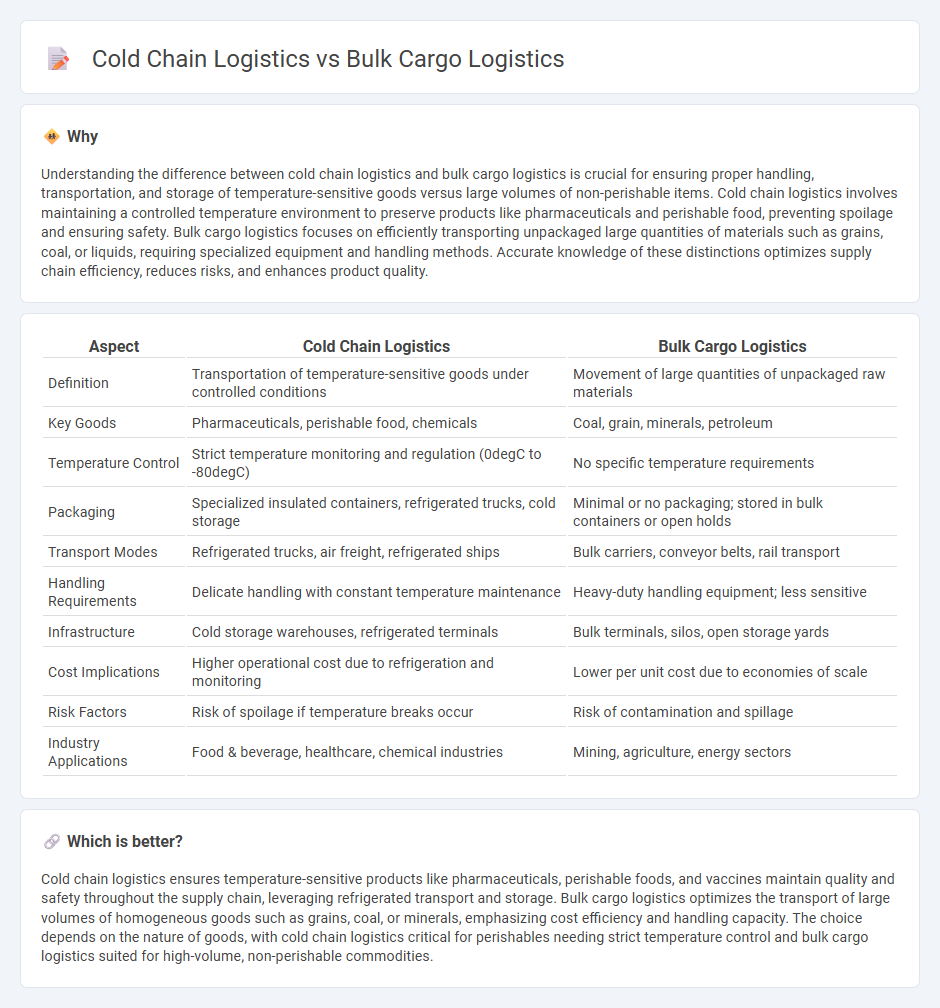
Cold chain logistics ensures temperature-controlled transportation and storage of perishable goods like pharmaceuticals and fresh produce, maintaining quality and safety throughout the supply chain. Bulk cargo logistics involves handling large volumes of unpackaged goods such as grains, coal, or minerals, focusing on efficient loading, transport, and unloading processes. Explore the distinct strategies and technologies driving optimization in both cold chain and bulk cargo logistics.
Why it is important
Understanding the difference between cold chain logistics and bulk cargo logistics is crucial for ensuring proper handling, transportation, and storage of temperature-sensitive goods versus large volumes of non-perishable items. Cold chain logistics involves maintaining a controlled temperature environment to preserve products like pharmaceuticals and perishable food, preventing spoilage and ensuring safety. Bulk cargo logistics focuses on efficiently transporting unpackaged large quantities of materials such as grains, coal, or liquids, requiring specialized equipment and handling methods. Accurate knowledge of these distinctions optimizes supply chain efficiency, reduces risks, and enhances product quality.
Comparison Table
| Aspect | Cold Chain Logistics | Bulk Cargo Logistics |
|---|---|---|
| Definition | Transportation of temperature-sensitive goods under controlled conditions | Movement of large quantities of unpackaged raw materials |
| Key Goods | Pharmaceuticals, perishable food, chemicals | Coal, grain, minerals, petroleum |
| Temperature Control | Strict temperature monitoring and regulation (0degC to -80degC) | No specific temperature requirements |
| Packaging | Specialized insulated containers, refrigerated trucks, cold storage | Minimal or no packaging; stored in bulk containers or open holds |
| Transport Modes | Refrigerated trucks, air freight, refrigerated ships | Bulk carriers, conveyor belts, rail transport |
| Handling Requirements | Delicate handling with constant temperature maintenance | Heavy-duty handling equipment; less sensitive |
| Infrastructure | Cold storage warehouses, refrigerated terminals | Bulk terminals, silos, open storage yards |
| Cost Implications | Higher operational cost due to refrigeration and monitoring | Lower per unit cost due to economies of scale |
| Risk Factors | Risk of spoilage if temperature breaks occur | Risk of contamination and spillage |
| Industry Applications | Food & beverage, healthcare, chemical industries | Mining, agriculture, energy sectors |
Which is better?
Cold chain logistics ensures temperature-sensitive products like pharmaceuticals, perishable foods, and vaccines maintain quality and safety throughout the supply chain, leveraging refrigerated transport and storage. Bulk cargo logistics optimizes the transport of large volumes of homogeneous goods such as grains, coal, or minerals, emphasizing cost efficiency and handling capacity. The choice depends on the nature of goods, with cold chain logistics critical for perishables needing strict temperature control and bulk cargo logistics suited for high-volume, non-perishable commodities.
Connection
Cold chain logistics and bulk cargo logistics are connected through their shared focus on specialized handling and transportation requirements to maintain product integrity and safety. Cold chain logistics ensures temperature-sensitive goods, such as pharmaceuticals and perishable foods, remain within strict thermal conditions, while bulk cargo logistics involves the efficient movement of large quantities of raw materials or commodities like grains, minerals, and liquids, often utilizing tailored storage solutions and transport modes. Both logistics types optimize supply chain processes by integrating advanced tracking technologies and infrastructure designed to preserve quality and minimize spoilage or damage during transit.
Key Terms
**Bulk Cargo Logistics:**
Bulk cargo logistics specializes in the transportation and storage of large quantities of unpackaged goods such as grains, coal, ores, and cement, often utilizing bulk carriers, railcars, and specialized storage facilities. This sector emphasizes efficient loading, unloading, and handling processes to minimize damage and optimize supply chain flow. Explore further to understand how bulk cargo logistics enhances supply chain efficiency and cost-effectiveness.
Bulk Handling Equipment
Bulk cargo logistics revolves around the efficient management of large-volume, unpackaged goods such as grains, coal, and ores, requiring specialized bulk handling equipment like conveyors, hoppers, and stackers to facilitate smooth loading and unloading processes. Cold chain logistics demands temperature-controlled equipment including refrigerated trucks, cold storage rooms, and thermal containers to preserve perishable items like pharmaceuticals and fresh produce throughout the supply chain. Explore detailed insights on how advanced bulk handling equipment optimizes logistics operations across these distinct sectors.
Storage Terminals
Bulk cargo logistics storage terminals handle large quantities of raw materials like coal, grain, and minerals, requiring robust infrastructure for efficient loading, unloading, and long-term storage under varying environmental conditions. Cold chain logistics storage terminals specialize in temperature-controlled environments essential for preserving perishable goods such as pharmaceuticals, food, and chemicals, employing advanced refrigeration and monitoring systems. Explore the specific operational requirements and technological advancements that differentiate bulk cargo from cold chain storage terminals.
Source and External Links
Bulk Cargo: Freight & Logistics Guide | Fulfill.com Glossary - Bulk cargo logistics involves transporting large quantities of unpackaged goods using specialized ships (bulk carriers), cranes, conveyor belts, pumps, and pipelines, requiring careful planning, coordination, and adherence to safety and regulatory standards.
Bulk Cargo: Definition, Containers, and Handling - Inbound Logistics - Effective bulk cargo logistics includes identifying cargo types, selecting appropriate vessels, planning safe loading/unloading, ensuring proper documentation, and maintaining coordination among all involved parties to handle volume, weight, and regulatory challenges.
Understanding the Types of Bulk Cargo in Shipping - FreightAmigo - Bulk cargo logistics faces challenges like contamination risks, environmental concerns, infrastructure limits, and regulatory compliance, which can be addressed through digital platform solutions offering real-time tracking, automated documentation, customs support, and sustainability-focused innovations.
 dowidth.com
dowidth.com